
BLOG
Relax, Their Blogging and Marketing Advice Doesn’t Apply to You
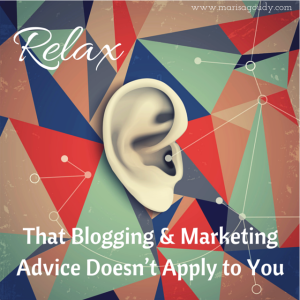 It’s your business to make life more beautiful, bearable, or bold for a select group of people.
You want to be more visible, telling your brand’s story and your own stories. Launching a blog or devoting yourself to a regular business writing process on your current website is the right decision.
It’s your business to make life more beautiful, bearable, or bold for a select group of people.
You want to be more visible, telling your brand’s story and your own stories. Launching a blog or devoting yourself to a regular business writing process on your current website is the right decision.
Here’s the first thing to do: stop listening to advice for bloggers.
Tune out the smart, reputable marketing experts with their experience and convincing facts and figures.
They’re not talking to you.
(And, of course, you also want to stop listening to the “get rich quick” business gurus, but you already knew that.)
But back to those intelligent, compelling marketing marketing minds and what elements of their advice you can ignore...
You’re Not the Every(wo)man Blogger
About 15 - 20% of Americans are involved in entrepreneurial ventures.
A large proportion of those individuals make utilitarian products and sell everyday services like septic tank maintenance. Most of those companies rely on old fashioned advertising to find new buyers.
There’s a smaller slice of the self-employed population that will experiment with content marketing and launch a blog or develop other types of media to educate and entertain and entice new business.
Though they’re surely speaking to marketing officers at larger corporations too, the majority of the blogging and marketing experts are pitching their message at this group of "traditional" business folks.
Since you’re an entrepreneur interested in creating content, you’ll want to listen to the same podcasts and consume the same articles as the car salesmen and the electricians, right? After all, there are business fundamentals that apply to everyone, don't they? You can just filter out the bits that don’t fit your ideal clients.
No.
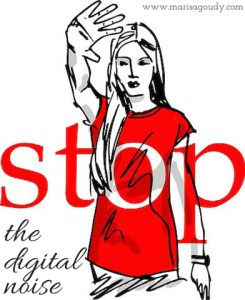 Stop filtering as you listen! There's too much noise in your life already.
Stop filtering as you listen! There's too much noise in your life already.
Move on immediately when you realize the speaker isn't talking to you. Find someone who is. They're out there and they want to address exactly what you're concerned about.
Good Marketing Advice That’s Not For You
Demian Farnworth is Copyblogger’s Chief Content Writer. As part of the company’s brand new podcast network, Demian hosts a show called Rough Draft. Here’s the pitch: “ If you’re a pure writer, and you wonder how you’ll be able to build your own online platform that actually gets seen, this show is your shortcut.”
I’m not exactly sure what a “pure writer” is, but I guess I’m not one of them and I don’t believe the creative entrepreneurs in my circle are either based on the recent episode, “An Idiot-Proof Guide to Writing Blog Posts That Google Loves.”
Demian is doing his listeners a great service as he describes the current state of SEO and debunks some of the myths around what’s often seen as a secretive world - if not a downright dark art.
He uses some well-known examples like eHow.com (hint: when the examples someone uses have absolutely nothing in common with your goals, approach, or audience it’s often a sign the advice is not for you).
And then he describes a Google’s engineer’s description of a high quality site comprised of more than twenty questions including:
- Does the article provide original content or information, original reporting, original research, or original analysis?
- Was the article edited well, or does it appear sloppy or hastily produced?
- Is this the sort of page you’d want to bookmark, share with a friend, or recommend?
- Is the content mass-produced by or outsourced to a large number of creators, or spread across a large network of sites, so that individual pages or sites don’t get as much attention or care?
- Would you expect to see this article in a printed magazine, encyclopedia or book?
I know your answer to every one of these questions.
I also know that you wouldn’t consider any answer other than your own to be acceptable - not of you’re going to put your good name on it and expect it to draw in the high caliber prospects that you’ve created a business to serve.
Now, there is nothing wrong with this advice. Until recently, the Web was a Wild West where tricks and gimmicks were just part of doing business. There are many people who need to hear Demian's info - including some conscientious, hard-working business people led astray by nefarious SEO “experts” who profited off of link farms and other low quality sites.
But since you’ve never considered buying content from a low value, low cost supplier and since you always strive to write pieces that are worthy of publication in a magazine your audience loves and trusts, why would you listen to this kind of advice (other than to feel superior to the swindlers and the nice guys who were duped)?
What Sort of Marketing & Business Advice Does Apply to the Creative Entrepreneur?
Who is your ideal marketing and business resource? The cop out answer is also the truest answer: “you’ll know 'em when you hear 'em.”
Develop your own powers of discernment and perfect your own filters so you can identify when an expert deserves your time and attention.
In order to have that kind of discernment you need to be clear on your own identity in the marketplace as well your own goals and needs. Know your own creative entrepreneur’s autobiography and what brought you to where you are now as a business owner and as an individual.
If you’ve never done business as usual, don’t judge your past or plot your future with one size fits all business advice.
If you were a vegetarian you wouldn't buy the #1 best selling guide to cooking spare ribs. As a creative entrepreneur with a storyteller's soul, don't get bogged down by advice for people who've tried to scam their way onto their audience's computer screens.
When you know and own your own entrepreneurial story you’ll become more comfortable with clicking away and searching out a more relevant resource when someone is blazing a path through “doesn’t apply to me" territory.
Don't Judge an Expert By One Piece of Content
Even if there's a seemingly limitless supply of marketing resources out there, you don't want to abandon relevant thought leaders because every statement isn't customized to your exact interests.
Without singling out Demian Farnworth too much, I want to be clear that I have listened to each episode of his new show and have found some great information mixed in with the stuff that doesn't need to be on my radar. In a previous Rough Draft episode on keyword research, Demian asks:
Will anyone read the online content you produce?
It’s a terrifying question, but an important one. If you’re committed to building a popular and profitable site, you’ll have to write, read, and talk about your topic almost every day for the next several years. You’ll invest thousands of hours, quite literally gambling with your time.
The question is, how will you approach it? Will you start writing and hope someone notices you? Or will you carefully research your niche, looking for the precise angle and language that will make your content irresistible?
I recommend the latter.
This statement - though yes, terrifying - speaks to the creative entrepreneur because it’s true of everyone on a quest to build a business through content marketing.
 And yet, he also reminds us of the importance “niche.” Just as you want to be sure to identify your own niche so you know how to speak to your audience, you want to be just as clear about whether you fit in a content producer's tribe.
And yet, he also reminds us of the importance “niche.” Just as you want to be sure to identify your own niche so you know how to speak to your audience, you want to be just as clear about whether you fit in a content producer's tribe.
Be a magpie, pulling inspiration from across the web, but also be choosy. Be willing to abandon any bit of information that doesn’t contribute to the knowledge base you’re seeking to build.
The Sovereign Standard is a publication that collects multiple perspectives on topics that are relevant to the creative entrepreneur. Subscribe for free here.
And if you're looking for writing help that is honed specifically for the needs of the creative entrepreneur with a storyteller's soul, I invite you to think about how I can help you get your ideas into a post that speaks to your ideal reader and client.
Why Myth Matters to Your Writing and Marketing
We need myth. We always have, and we always will - if we want to retain our humanity.
Called “a roadmap to the human psyche,” myths exist to explain the big questions like “for what reason was I born?” and “what will happen to me when I die?”
Myths lay out pretty clearly what is on the human smorgasbord: what we want, what we fear, what we would like to have, what we would very much not like to have. Those human fears and human desires really have not changed, and they're reflected in the myths that have been with us for a long time.
--Margaret Atwood
Myths are also indispensable when it comes to less existential matters like creating a Hollywood blockbuster, writing a novel, and assembling a marketing plan.
The Myth that Everyone Knows: The Hero’s Journey
The Hero’s Journey as originally framed by Joseph Campbell is something of a cultural standard these days, particularly for storytellers.
Turns out, “everyone” wasn’t always aware of this great twelve part cycle until Christopher Vogler brought it to Hollywood’s attention in the mid-1980s (at least that’s how he tells it). Of course, it was hiding in plain sight as George Lucas’s Star Wars had already transported us to a galaxy far, far away and transformed movie hero-dom forever. (Later, John Wayne, we've got a farm boy with a character arc!)
Vogler offers great advice on following the Hero framework when crafting a story (this also applies to any attempt to lay your ideas over someone else’s framework):
As with any formula, there are pitfalls to be avoided... The hero myth is a skeleton that should be masked with the details of the individual story, and the structure should not call attention to itself. The order of the hero’s stages as given here is only one of many variations – the stages can be deleted, added to, and drastically re-shuffled without losing any of their power.
The myth is infinitely flexible, capable of endless variation without sacrificing any of its magic, and it will outlive us all.
(While you’re brushing up on the basics of the Hero’s Journey, do check out the summary of the Heroine’s Journey by Maureen Murdock too… I know I’m intrigued.)
The Hero’s Journey through the Marketplace
The hero's story is is a human story that speaks to us on multiple levels. At its best, the Hero’s Journey can connect people with resources that will better their lives. At its most banal, it can be used to make people buy stuff.
First, the “what NOT to do” example.
In Brand Storytelling: 10 Steps to Start Your Content Marketing Hero’s Journey, you’re guided through “The CM Brand Hero’s Journey."
Stop. Right. There.
Develop a marketing and content strategy with you or your brand in the hero’s role and you’ll alienate those who really matter to the story: the people who invest in your work and use it to change their own lives.
The brand is not the hero, just as the writer is not the hero. In case you forgot, Pamela Slim will remind you: It is not about you.
Lest we get sidetracked, deriding those evil marketers who cheapen and co-opt everything, there are clever, useful, sensitive ways to apply this wisdom to business.
Copyblogger’s Brian Clark masterfully re-envisions the role of the brand in the hero's tale: the magical mentor.
The mistake most often made in “marketing” is thinking of your business as the hero, which results in egocentric messages that no one else cares about.
The prospect is always the primary hero, because they are the one going on the journey — whether big or small — to solve a problem or satisfy a desire.
Another reason to tune in to this New Rainmaker podcast: Echoing the cyclical nature of the hero’s journey, you get a new perspective on the funnel: the concentric circles of belief. (If you're excited by the Heroine's Journey this "feminine" diagram of the sales process may really appeal to you.)
A New Mythic Model for the Magical Mentor
Brian Clark employs two of our most beloved mentors to illustrate his point: Obi Wan and Morpheus from The Matrix. You know these guys. You'd trust them if you were chosen to save the world.
Here’s another option that hasn't hit the multiplex: the Sovereignty Goddess.
As I describe in my St. Patrick’s Day post, 5 Lessons on Writing and Entrepreneurship from an Irish Goddess, the Celtic Sovereignty Goddess plays a vital - though fleeting - role in the creation of the hero. She owns her magic and never stresses about playing second fiddle.
“Just” having a supporting role in the hero’s journey is actually what being a storyteller or running a business is all about.
This introduces the paradox of the hero:
We don’t need another hero. Everyone is a hero.
You’re most effective when you realize you’re not the hero of the piece you’re writing or the business you’re running. And yet, you must remember you're the hero of your own story.
The Hero’s Quest: Be of Service
“The hero’s journey is to be of service”: that’s Lisa Engel’s “ah ha” statement at the end of this episode of The Jess, Scott, and You show, “In the Service of Others.” (I had the good fortune to be a guest on this particular show too.)
Though it’s true that it’s not all about you (here, Susie Moore explains why that is such a good thing), you are also on your own quest. You must practice self-care and act from self-love and self-interest in order to grow and meet your potential (we discussed that at length on the show).
You'll never prove your heroism through an egotistical romp aimed showing off your skills and authority. Instead, you become the hero through a willingness to imagine, learn, endure, transform, and then bring the magical elixir home.
Who are your heroes? How have you been called to take on the role of the hero? And what has that taught you about who is really in charge? Leave a comment or tag me with the answer on your favorite social media platform.
5 Choices You Make Every Time You Write a Post
One's philosophy is not best expressed in words; it is expressed in the choices one makes... and the choices we make are ultimately our responsibility. Eleanor Roosevelt
What? There’s something words can’t do? Yes, thank goodness.
Every writer knows that the most profound aspects of life stretch the limits of language. That’s why we seek out those liminal, wordless spaces. And, because we’re a bit mad, we then return to the desk and try to prove that it’s possible to express the inexpressible.
Regular Voyages To the Space Beyond Words
Four weekends a year I escape my responsibilities as mother, wife, and entrepreneur and I attend class at the Sacred Center Mystery School - my home for personal and spiritual development work. This is where my teacher and mentor first introduced “the goal is to become sovereign in your own reality” - the phrase that has launched my personal and professional quest for sovereignty.
What I absorb at the Sacred Center is folded into what I think Eleanor Roosevelt would call my “philosophy.” I receive teachings that both precede and supercede words. The alchemical process of turning experience into language begins when I get home and the irresistible urge to write takes over.
We explored “choice” during this latest class. I saw my life as a series of spirals and arcs rather than right or left turns. In countless instances from meeting my husband to quitting my job and becoming an entrepreneur, it seemed like life had mostly happened to me.
There was a healing around this for me - now I'm ready to recognize all of the ways "I have a choice" echoes through each day.
After all, I choose every word I write (when autocorrect doesn’t think it’s smarter than me, at least!).
How much will you reveal? You always get to make that choice
 As part of the Message Discovery and Development Process, a client who wrote her creative entrepreneur’s autobiography went deep into what inspired her to become a healer. She spent a lot of time considering and organizing the story, and was very honest in the telling, but there was a resistance when we discussed what she’d written.
As part of the Message Discovery and Development Process, a client who wrote her creative entrepreneur’s autobiography went deep into what inspired her to become a healer. She spent a lot of time considering and organizing the story, and was very honest in the telling, but there was a resistance when we discussed what she’d written.
Beyond a doubt, getting to the core of her “why” to understand the origins of the work was worthwhile. And yet, details of her personal trauma and descriptions of the bumps on her road to success clearly weren’t to be included in the story she’d tell on her About page.
It felt too personal. Her professional identity was not enhanced with that level of vulnerability - at least not on this particular page of her website. Plus, the story was long and people were coming to the website for her healing skills, not because they were interested in reading a spiritual memoir.
And so, a three thousand word journey was distilled to three paragraphs and together we decided that she’d focus on what she had learned from her journey: her philosophy of connection and healing.
5 Choices You Can Make Every Time You Write a Post
No one is making you blog for your business or forcing you to write guest posts to boost your visibility. You’re dedicating yourself to a writing practice because you know writing matters to your business.
Once you’ve made the choice to write, there are so many more empowering choices you get to make:
- The voice: The basic rule, especially when writing for the web, is “write like you talk.” That’s good advice, but you certainly use a different tone and vocabulary when you’re dishing with girlfriends than when you’re presenting to the school board.Will you be nurturing, professional, something of a smart ass, or somewhere in between?
- The form: They say people love list posts, and it’s true that the average internet reader likes to scan through logically organized information. But don’t just shape your writing to fit the bloggers’ advice - write to support your story and the needs of your specific audience.
Will you break out the old reliable “5 ways to…” or tell a story or present case studies? You always have the option of combining forms (just like this post does). - The reason for writing: You’re writing because you see each blog post as an opportunity to educate, entertain, or inspire. You’re also writing a post to get the reader to do something that betters her life and connects her more deeply to what your brand has to offer. The post needs a clear call to action or CTA. Direct your post to a final “ask.”
Will you choose to promote a product or program in the last line? Maybe you just want to ask the reader to subscribe to your email list (after all, that is where most sales are eventually made). - The details: As described the healer involved in the Message Discovery Process realized, not every detail of the story has to make it into the post. Some details may be for your eyes only while others may be the seeds of future articles.Once you’ve written the first draft, try to leave it alone for a few days or at least few hours. When you come back, what extraneous details can you cut and what key ideas can you bring to the fore?
- The visuals: As you write, you have the opportunity to choose metaphors that help your reader picture what you’re talking about. Because images are so important to blog posts, you also get to choose the photos and illustrations that will really prove your point (and make the whole blog very “pinnable” and easy to share on social media). How will you make the blog post cohesive - a selection of photos from the same location, a series of related quotes, a handful of drawings that have the same vibe?
I chose to make this a post about expanded consciousness and a healer’s journey into self-awareness and a relevant about page, so I can’t really switch tones and conclude with “you can pick your friends, you can pick your nose, but you can pick your friend’s nose.”
But then, I am still feeling invigorated by the power of choice and I can choose to ignore my own well meant advice!
For a weekly collection of inspiration and ideas for the creative entrepreneur, subscribe to the Sovereign Standard where it’s all about setting your own standards (and breaking your own rules as you see fit).
What You'll Gain From a Business Writing Practice (Besides Blog Posts)
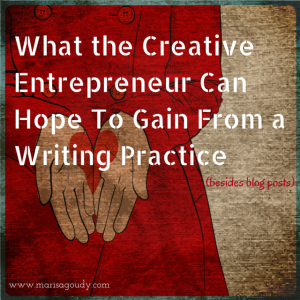 If you’re only creating content for content’s sake, you’re missing something important.
Yes, every internet savvy creative entrepreneur is supposed to produce regular content for the blog and other online outposts, but there’s more to the writing process than sales pitches and knowledge transmission.
If you’re only creating content for content’s sake, you’re missing something important.
Yes, every internet savvy creative entrepreneur is supposed to produce regular content for the blog and other online outposts, but there’s more to the writing process than sales pitches and knowledge transmission.
The internet beast is insatiable, and if your only reason for writing a blog post or producing a newsletter is to check another chore off your list, you’ll always be stressed about keeping up.
When your heart isn’t in the words you produce, you’ll never connect to your readers the way you hope. You’ll start to believe that this whole content marketing thing is a racket and that writing on behalf of your business is just a waste of time.
To remain true to your creative business vision and to keep your personal equilibrium, you must get more out of the writing-for-your-business process than “I got it done.”
Expect Your Writing to Give Back to You
 Good, consistent content supported by a smart, sustained online sharing strategy will build your business because that’s plain good marketing. But, if you expect more from your writing practice, you’ll receive even more in return.
Good, consistent content supported by a smart, sustained online sharing strategy will build your business because that’s plain good marketing. But, if you expect more from your writing practice, you’ll receive even more in return.
5 Unexpected Benefits of a Writing-For-Your-Business Practice
- The writing process reconnects you with your “why” and helps you go deeper into the mission of your company and the meaning of your work. There’s no better way to stay true to the entrepreneurial adventure than through the personal exploration and public declarations that are inherent to this new art of online writing.
- If your mission is at the core of your business, writing also helps you explore the outer edges of the work. Drafting into “what if…?” style questions will reveal new possibilities and directions.
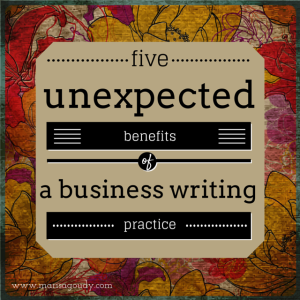 You are able to speak more fluently about your work and what you have to offer in any setting - at an in-person networking event or in an online exchange where it’s appropriate to talk about how your company can help solve a problem
You are able to speak more fluently about your work and what you have to offer in any setting - at an in-person networking event or in an online exchange where it’s appropriate to talk about how your company can help solve a problem- For all that you may identify as a “creative” it can be easy to lose track of your creator’s mojo due to the demands of entrepreneurship. Writing is your chance to stoke the fires of your creativity while still remaining engaged in your business.
- When you start telling your business’s stories you’ll find yourself uncovering new aspects of your own story. Even if you don’t reveal everything in the public narrative, this sort of personal insight is invaluable and the essence of true success.
But Sometimes, the Writing is Still a Struggle
This post ended up being a killer to write.
I have a long term business project on my mind, my schedule is thrown off due to the snow, and life just wants my attention to be elsewhere.
Writing about how wonderful it is to write for your business seemed disingenuous as I had just peeled a crying baby from around my neck, thrust her into my husband’s arms, and growled “please, I just have to get these damn ideas on paper and then I will make dinner!”
This post ended up being the greatest test of my authenticity and my alignment to my own mission.
After a few false starts, I scrapped my original idea and wrote into the pain and frustration of having to write in the first place. I railed a bit against the content creation imperative and my own self-imposed editorial calendar. I ranted about how hard all this was and how thankless it all felt.
Most of what I wrote was garbage and only a few phrases will appear here in the final draft, but in that for-my-eyes-only scribbling, I caught a glimpse of why I’m doing all this.
As much as I kept saying I felt guilty for abandoning my teething babe and for admitting that I didn’t want to hear my kindergartener practice whistling any more, I needed the break. Only the “mama just has to get some writing done” announcement would secure me passage to the quiet oasis on the other side of my office door.
The writing practice is a demanding one, but it's all the sweeter for the sweat it occasionally demands. I see the greater worth in the process and only by walking through its fires can I emerge on the other side, honestly able to tell you that you can stand the heat and you will create something important.
Is Your Business Sustainable? Your Writing Practice May Reveal the Truth
I wrote myself out of my fevered angst and ended up feeling better when I took my own medicine, but what if writing for your business never seems to get easier or offers up the fringe benefits I describe above?
You deserve (and need!) a business that you can maintain. It may not all be effortless, but, ideally, your work only requires the smallest degree of push and strain. Content marketing (ie. blog writing, podcast production, YouTubing) is key for anyone who wants to drum up business online and it will take up a portion of your workweek when you’re taking it seriously.
If you feel like writing for your business is a constant “<sigh>, if I must,” something is wrong. This sort of resigned martyrdom will come through what you write and you’ll never get the results you hope for.
I’d love to help you through this struggle. Contact me and we’ll set up a brief chat to clear away some of your writer’s blocks and come up with a few solutions so you get more than just a blog post out of your next writing session.
Online Visibility, Transparency, and Authenticity When You’ve Got Other Things On Your Mind
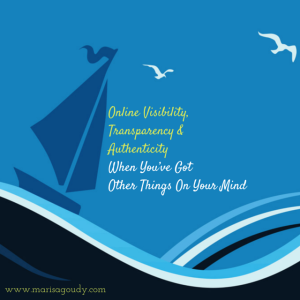 Entrepreneurship springs from optimism. You believe in the vitality of the marketplace and your own potential. You understand that your livelihood relies on your energy and vision. You have a faith in yourself and your tribe and the world as a whole.
But what if you’re just not feeling it right now?
Entrepreneurship springs from optimism. You believe in the vitality of the marketplace and your own potential. You understand that your livelihood relies on your energy and vision. You have a faith in yourself and your tribe and the world as a whole.
But what if you’re just not feeling it right now?
We get stuck in the doldrums sometimes. Maybe it's due to illness or the needs of the family or this endless winter (this week’s Sovereign Standard offers balm for the snowed-in February soul).
Regardless of the source, these low periods are real and sometimes you can't just put on a happy face and push through, business as usual.
You Can Keep Sailing Your Professional Ship - Despite Private Tidal Waves
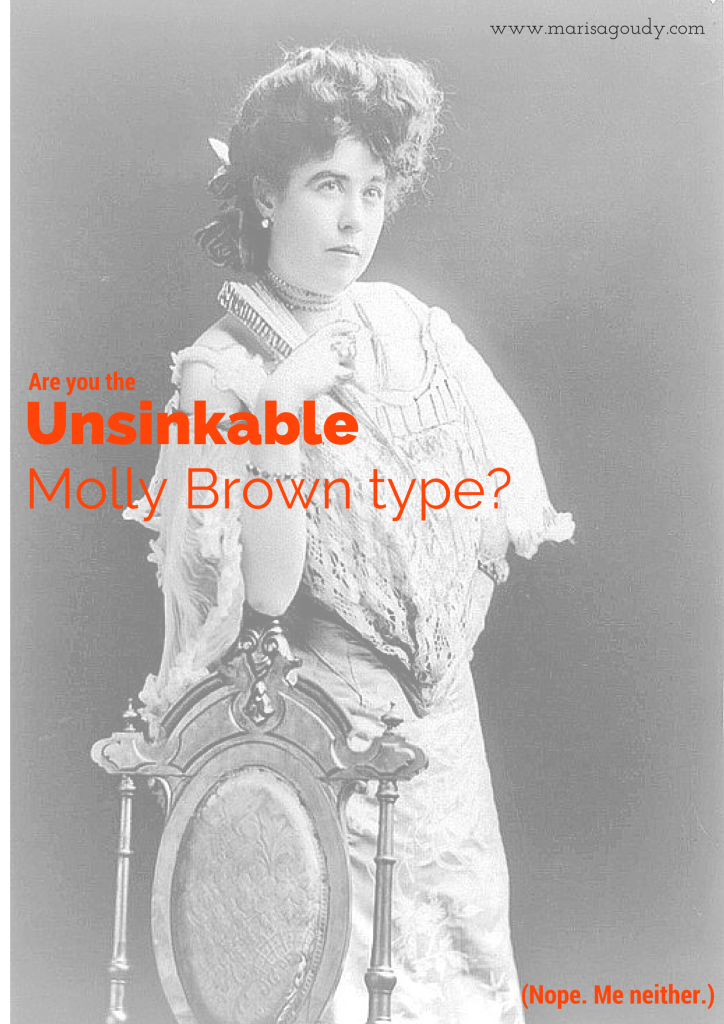 Maybe you’re one of those unflappable people whose personal relationships or interior monologues never gets in the way of her work. Maybe. But I doubt you’d click on a blog post with this title if you were. For the purpose of full transparency, you and I probably won’t be soul mates if you’re the Unsinkable Molly Brown type.
Maybe you’re one of those unflappable people whose personal relationships or interior monologues never gets in the way of her work. Maybe. But I doubt you’d click on a blog post with this title if you were. For the purpose of full transparency, you and I probably won’t be soul mates if you’re the Unsinkable Molly Brown type.
Time for more disclosure: I have big feelings and big ideas and sometimes they cause huge waves that threaten overturn my little professional skiff.
You too? Wonderful. Keep reading - there’s some ideas for how to survive these internal tempests and an extended boating metaphor in it for you!
Decide What You’ll Throw Overboard BEFORE the Storm Hits
You set out on the entrepreneurial journey with dual goals: adventure and prosperity. You were prepared to do the creative work as well as the grunt work. Your vision would become a service or product that filled a need and was worthy of your clients’ investment.
Though you may not have thought about it in any detailed way, you planned on showing up fully as you. After all, the reason you’re taking the risk of self-employment is for the ultimate fringe benefit: independence and the freedom to plot your own course.
The thing about being you - about being human: stuff happens. Storms hit. And the best laid professional plans are practically worthless when you’re in survival mode.
Well, those professional plans aren’t totally worthless. Before crises hit you can set priorities, develop systems, and hire back up so that clients won’t feel seasick when you're caught in a riptide.
And you can decide what’s on the bottom of your list.
This post is to help you decide what to cut loose before the ship starts going down. My suggestion? Your online presence.
Yes, the woman whose business is based on writing, content creation, and feeding the hungry internet beast in a graceful, sustainable way just told you to put your online presence last.
Note: that doesn’t mean that you put your writing last. Goodness knows the only way to survive a personal crisis is often a nice glass of red and a long session with your journal, but I digress…
Why Your All-Important Online Presence Isn’t All That Important Sometimes
You build an online presence in order to increase your visibility. If you’re not being seen you’re not building brand recognition or accruing those vital “know, like, and trust” points.
Does that make the online world sound way too much like appearing at a high school hangout on Friday nights? I meant for you to squirm a little with that one.
As important as visibility is, it’s also a bit trivial. Was one missed party social suicide when you were a sophomore? Is one week without Twitter going to damn you to obscurity?
Of course not. If you completely vanish from, the scene the conversation will eventually move on without you. But if you stick around your professional online haunts even when you feel like an emotionally crippled zombie, you risk your sanity - and potentially your reputation.
But What About Transparency and Authenticity?
Transparency and authenticity are two of the buzziest buzz words out there when people talk about how to “do” social media. They’re also some of the most flexibly defined words in the modern lexicon.
Let’s consult the bona fide word experts at Merriam Webster:
Transparency: the quality or state of being transparent: able to be seen through; easy to notice or understand; honest and open; not secretive
Authenticity: the quality or state of being authentic: to be real or genuine : not copied or false
Remember, friend, in this particular scenario, you’re a mess. You want to crawl into your bunk with a big thick book (this one features a shipwreck in keeping with our theme) or take up permanent residence on a desert island.
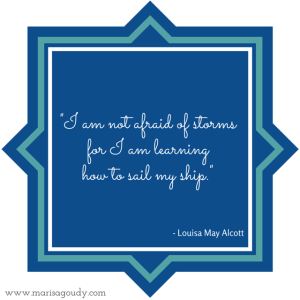 When you're wracked with doubt or swept up in a personal hurricane, transparency is not necessarily your ally. You don’t want or need to share all the details of this process just because you’re dedicated to being “real” online.
When you're wracked with doubt or swept up in a personal hurricane, transparency is not necessarily your ally. You don’t want or need to share all the details of this process just because you’re dedicated to being “real” online.
Lots of smart people have explored the intersections of transparency and authenticity (Gina Fiedel offers two of my favorites here and here.
Transparency is Optional. Authenticity is Mandatory.
You’ve got a lot of discretion when it comes to what you reveal, but as a creative entrepreneur whose work is fueled by your passions, authenticity isn’t something that you want to start skimping on.
Your child is sick. You’re dealing with a mental health issue. Your mother-in-law just moved in. These situations are casting some long shadows over your optimism right now. It may feel good to step into the light of the always glowing digital world and talk about growth and hope, but you may also feel like an underpaid actress desperately pretending the script isn’t flat and the working conditions aren’t horrible.
Sometimes the most authentic, connected thing you can do is gracefully step away from the screen.
You may want to post a little note to the effect of "gone fishin'" or you may simply trust that you'll be back soon enough and your dedicated online community will greet you with open arms when the time is right.
Alternatives to a Complete Digital Hiatus: 3 Ways to Keep Up Online Appearances
 Sometimes you need to just pull away. Being online when you feel vulnerable can make you feel too exposed - even if you’re not talking about anything personal. But if you can get your head around doing some simple online chores there are ways to keep up appearances:
Sometimes you need to just pull away. Being online when you feel vulnerable can make you feel too exposed - even if you’re not talking about anything personal. But if you can get your head around doing some simple online chores there are ways to keep up appearances:
- Post from your archives: You barely remember what you wrote last fall, so there’s a good chance that your older material will feel fresh to your readers. Plan ahead and make this easy on yourself: create a spreadsheet and record every post’s title, category, keywords, and meta description so you don’t just start picking old blog posts at random.
- Create media with the books that are getting you through: If a novel or a gripping work of non-fiction is your solace during this tough time, pull some quotes and use WordSwag to create a neat little graphic that’s easy to Instagram and share across social media.
- Build a list of ten or more trusted allies' sites and repost their content: Sharing others’ content may be a natural part of your day when you’re stopping by Facebook regularly, but think ahead for the times when you’re away from your usual digital hang outs. Create a list in Feedly or Twitter and repost content from your savvy friends and wise colleagues.
Despite the fact that I’ve barely been outside in months, I’m still keeping my ship afloat. Check out this week’s Sovereign Standard and subscribe to see you’re not the only one suffering during this long winter and to pick up some inspiration for finding warmth in the endless white veld.

